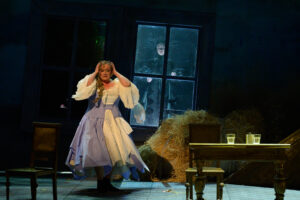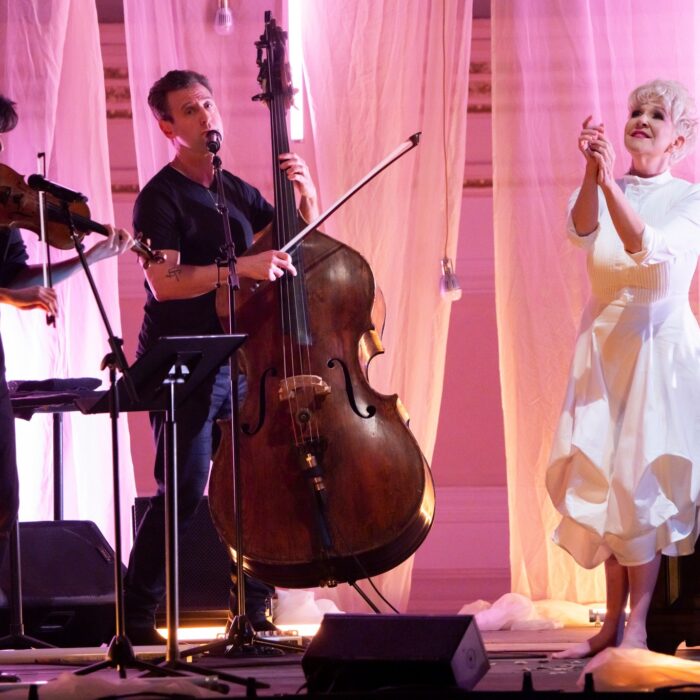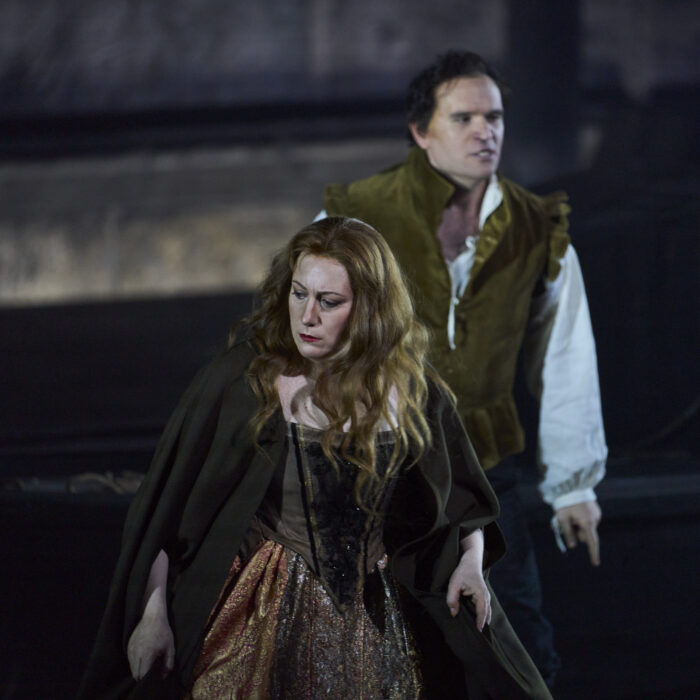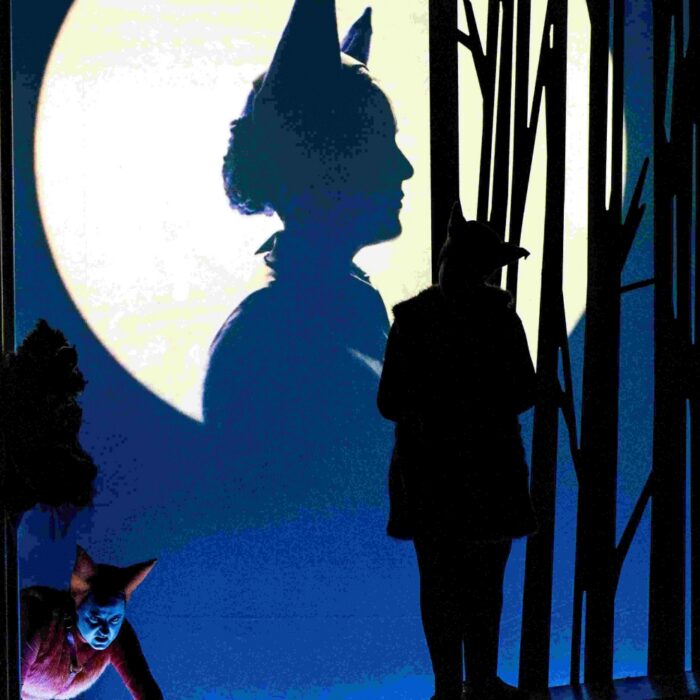
The Slovak National Theater Opera 2023-24 Review: The Kiss
Porubčinová Leads In Well Presented Production
By Alan Neilson(Photo: Henrich Mišovič)
Most opera goers are familiar with Smetana’s “The Bartered Bride.” Yet, if asked to name one of his seven other operas, many would struggle to come up with an answer, which is not too surprising given how infrequently they are staged in theaters outside of the Czech Republic and Slovakia. This in itself gives rise to the question of why they are not presented more regularly. Is “The Bartered Bride” the only one of Smetana’s operas that is deserving of frequent performances? Maybe it is the quality of the libretti?
If one were to read the libretto to his opera, “The Kiss,” for example, one would no doubt be disinclined to rush out for a ticket. Written in 1875 by Eliška Krásnohorská, the narrative relates the tale of Vendulka and the widowed Lukáš, who are in love with each other. He is desperate to marry her, and she is desperate to marry him. Unfortunately, she is a strong-willed woman with a finely tuned sense of what is right and wrong, while he is a strong-willed man in a hurry. He wants to kiss her, but she refuses, as she wants a decent period of time to pass after the death of his wife. He storms off and attempts to embarrass her by cavorting with the local girls, causing Vendulka to run off. Lukáš, after some searching, finds her and apologizes. She forgives him and offers to kiss him. However, he is so ashamed of his behavior that he refuses, feeling he is not worthy of it. Finally, they are reconciled, bringing the opera to a happy end.
It is hardly a tale to get the pulse racing. The fact that both the protagonists are decent people does little to spice up the plot, and the appearance of a gang of smugglers provides little in the sense of danger or ill-intent as their leader, Matouš, is also a well-meaning soul who tries to help them. Nor is it an in-depth psychological exploration of a man and woman in love. It is all superficially played out; nothing is too deep; nothing strays too far from the stereotypical. It is basically a light tale set in the Czech countryside, full of peasantry, farmyards and forests.
Hlinková’s Clear Sighted Direction
Yet the production by the Slovak National Theatre Opera proved that this is actually a nicely crafted work that zips and bubbles along. The director, Andrea Hlinková, did not even make an effort to turn it into something different; there was no attempt to uncover hidden themes or play up subconscious motivations. Rather, she embraced the opera for what it was – a simple folk tale – and staged it in that manner. The costumes, designed by Boris Hanecka, were traditional in appearance, although with the occasional twist, either for comedic effect or aesthetic reasons, which successfully complemented Miriam Struhárová’s sets that were rustic in design. They, too, were traditional, containing the occasional oddity; in the first act, set in Paloucky’s house, for example, some of the furniture was positioned at odd angles and was half-submerged beneath the floor, possibly suggesting that things are not quite as balanced as they appear to be on the surface.
The night scene set in the forest that opens Act two was expertly staged. Shadowy, dark trees sprouted from left and right, between which a pathway dropped towards the front of the stage. Everything was covered in a white mist, out of which emerged the band of smugglers, semi-camouflaged as animals, allowing them to move between roles as smugglers and night animals. It was very atmospheric and conjured up a feeling of the supernatural. It was also a very dramatic scene that acted as a strong contrast to the domestic scenes that surrounded it and prevented the work from becoming too monotonous or one-paced.
Hlinková also used the scene to introduce an apparition of Lukáš’ dead wife, who signifies her blessing for the union of the two lovers. She is not included in the libretto, but it was a good decision on the part of the director, as receiving such validation made Vendulka’s change of heart far more convincing.
Unsurprisingly, the relationship between the two lovers was at the center of Hlinková’s presentation throughout the evening, which she handled boldly yet with sensitivity to create a totally believable relationship. However, she also embraced the librettist’s original idea about the work, which was to portray the life of and the dynamics in a typical Czech village in the first half of the 19th century. This was achieved mainly through the use of the chorus, which was given a very active role. Rather than standing around passively, singing their pleasant folk-inspired choruses, it was used to pressure Vendulka and Lukáš to conform to the ways of the village, crowding around them and waving scythes and other farm implements in an attempt to bring them into an acceptable relationship. It was a clever device that allowed the pressure to manifest itself visually. At the same time, it also added depth to the context of life in a small village, which can be inward-looking and intolerant of infractions of even minor behavioral norms.
Hlinkováo decorated the drama with a light touch of comedy; nothing too heavy, but enough to raise the occasional laugh without detracting from the seriousness of the relationship between the lovers. This was again mainly achieved through the chorus. For example, at one point, the peasants all donned sunglasses to see more clearly what was going on. There were also other instances, such as Vendulka’s light blue and white costume with her blond hair tied up in blue ribbons, which gave her an amusing childlike appearance and accentuated her innocence.
In total, it amounted to a visually pleasing production with a strong forward momentum that managed to make the most of what on paper appeared to be a thin plot.
A Musically Strong Performance
The musical side of the performance was managed by the conductor Jaroslav Kyzlink, who produced a vibrant, beautifully balanced reading from the SND Opera Orchestra. From the outset, there was vibrancy and brio that swept the drama forward: the overture sparkled, the choruses oozed energy, and their folksy, light melodies were dispatched with a charming swagger. He elicited sensitive readings from the soloists in which their changing emotions were expertly captured, shifting the soundscape from the warm and detailed to the light and breezy to the angry and fractious while managing to maintain musical coherence over the course of individual scenes.
The star of the evening was certainly soprano Mária Porubčinová in the role of Vendulka, whom she portrayed as an emotionally sensitive yet strong-willed individual who appeared prepared to give up the man she loved for her principles. In what was a convincing performance, both the flexibility of her acting and singing impressed as she adapted to her character’s changing moods with ease. When stubbornly resisting Lukáš’ pleadings for a kiss, her voice was resilient and tinged with an increasingly defiant tone as his frustrations and insistence increased. Minutes earlier, her voice was soft and lyrically engaging as she sang a love duet with him. Towards the end of Act one, she sings the lullaby “Go to sleep, my little angel” to Lukáš’ son, in which her voice took on a sweet, calming quality. Yet it is also a voice capable of moving easily into the upper register and rising above the chorus and orchestra to create a thrilling musical climax. Moreover, she was always sensitive to the other singers, so there was always a pleasing balance in the ensemble pieces.
Tenor Tomáš Juhás was a fairly impulsive and hot-headed Lukáš, prone to outbursts of anger that, however, stopped short of physical violence. He was passionate and convincingly displayed his deeply held feelings for Vendulka, notably so in their duet, “We belong to one another,” in which he successfully showed off his sweet, lyrical singing with its radiant glow in the upper register. He was equally at home when losing his temper, as he altered his mode of expression to voice his frustrations.
Vendulka’s father, Paloucky, was played by bass Jozef Benci, who produced a polished performance that captured his character’s wisdom and his authoritative position within the household. Singing with a relaxed air, he exuded a degree of gravitas that commanded respect, which was amplified by his resonant, expressive and carefully crafted phrasing.
Vendulka’s aunt, Martinka, was essayed by mezzo-soprano Terézia Kružliaková, who produced a lively reading in which she played up the character for all its worth. She was always up to something, either advising or consoling Vendulka on her relationship with Lukáš, involving herself with the smugglers’ web to gain a little extra money, or joining in with general goings-on. She possesses a rich, colorful palette, which she used intelligently to bring vocal depth to her character.
In a similar vein, baritone Daniel Čapkovič produced a larger-than-life presentation of Lukáš’ brother-in-law, Tomeš. He was always taking the opportunity to have a bit of fun with the women, but he was also genuinely concerned for Lukáš’ wellbeing. His singing was resonant, clearly articulated and beautifully crafted to bring out the meaning of the text. His duet with Lukáš, “Just ask her for forgiveness,” was particularly successful in showing off his sensitivity to the dramatic situation.
Soprano Andrea Vizári, cast in the role of the servant girl, Barče, produced a suitably good-natured, flirtatious reading that captured her character’s youthful energy and enthusiasm. Her Act two aria, “Announce little bird,” reflected her nature beautifully as she indulged in a light, breezy rendition that showed off her pleasing, rather than scintillating, coloratura and nicely adorned phrasing to good effect.
The role of the smuggler, Matouš, was given a strong and lyrically appealing presentation by the bass Jiri Pribyl. His direct, firm and expressive singing gave him a strong presence, which his horned costume magnified. His part in the trio “Why did I ever believe it?” showed off his voice splendidly as he combined sensitively with Martinka to console Vendulka in one of the work’s most attractive pieces.
An underwhelming libretto it may be, but “The Kiss” has more to it than one may expect. Certainly, Smetana’s music alone, with its beautiful melodies, is worth the price of a ticket, and with a director sensitive to its possibilities, as in this case, the drama is able to hold the attention of the audience.
It is also amazing to reflect on the fact that Smetana was deaf when he composed the opera.



